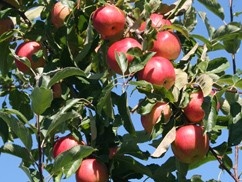Organic Friends' E‑zine: January 2017

Photo of the Month, by Andy Hammermeister
The cold winter months are a great time to connect with your community, learn and share. Here, seed cleaning, nutrient management and research needs are discussed at an organic grain producers meeting in southern Saskatchewan in the fall season of 2016.
In this issue:
We want your input! Have your say in guiding research priorities for Canada’s organic sector. Collect your thoughts with a group of peers and participate in the 2016-17 assessment of organic research needs and priorities. A clear list of research priorities is needed to guide provincial and national funding initiatives and inform researchers as to where they should direct their efforts. The Research Needs Task Force of the Organic Value Chain Roundtable is leading this initiative; data is being collected and summarized by the Organic Agriculture Centre of Canada, Dalhousie University. See below or visit the OACC website for more details, videos to inspire and instruct you through the process, and forms to submit with your input by February 28, 2017. |
|
- Research from University of Guelph Centre for Urban Organic Farming: High Tunnels
- The Canadian Organic Grower Magazine. 2016
Crop Rotation
- Green Manure Tool Kit: A practical guide to growing green manures
- Developed for the Prairie Organic Grain Initiative by the Organic Agriculture Centre of Canada
- Developed for the Prairie Organic Grain Initiative by the Organic Agriculture Centre of Canada
Pest Management
- Strategies for Successful and Sustainable Weed Management
- Pivot and Grow Video Series. 2016
Nutrition, Safety and Health of Organic Foods
- Human health implications of organic food and organic agriculture [PDF – 1.9 MB]
- European Parliamentary Research Service. 2016
Soils and Fertility
- Belowground nitrogen transfer from legumes to non-legumes under managed herbaceous cropping systems. A review
- Agronomy for Sustainable Development (2016) 36: 58
- The elusive role of soil quality in nutrient cycling: a review
- Soil Use and Management (2016) 32: 476-486
- Weedy fallow as an alternative strategy for reducing nitrogen loss from annual cropping systems
- Agronomy for Sustainable Development (2016) 36: 61
Horticulture
- Establishing peach trees for organic production in Utah and the Intermountain West
- Scientia Horticulturae (2017) 214: 242-251
Field Crops
- Cropping systems modify soil biota effects on wheat (Triticum aestivum) growth and competitive ability
- Weed Research (2017) 57: 6-15
- Environment and genotype effects on antioxidant properties of organically grown wheat varieties: a 3-year study
- Journal of the Science of Food and Agriculture (2017) 97: 641-649
Crop Rotation
- Factors influencing crop rotation strategies on organic farms with different time periods since conversion to organic production
- Biological Agriculture & Horticulture (2017) 33: 14-27
- Green manure-15N absorbed by broccoli and zucchini in sequential cropping
- Scientia Horticulturae (2017) 214: 209-213
- Influence of durum wheat-faba bean intercrop on specific quality traits of organic durum wheat
- Biological Agriculture & Horticulture (2017) 33: 28-39
- Influence of root and leaf traits on the uptake of nutrients in cover crops
- Plant and Soil (2016) 409: 419-434
Pest Management
- Controlling Rumex obtusifolius by means of hot water
- Weed Research (2017) 57: 16-24
- Field density and distribution of weeds are associated with spatial dynamics of omnivorous ground beetles (Coleoptera: Carabidae)
- Agriculture, Ecosystems & Environment (2017) 236: 134-141
Livestock
- Prevalence and risk factors for extended-spectrum β-lactamase or AmpC-producing Escherichia coli in organic dairy herds in the Netherlands
- Journal of Dairy Science (2017) 100: 562-571
Ecology and Environment
- Effects of changing farm management and farm structure on energy balance and energy-use efficiency—A case study of organic and conventional farming systems in southern Germany
- European Journal of Agronomy (2017) 82: 242-253
Nutrition, Safety and Health of Organic Foods
- Potential of NIR spectroscopy for predicting internal quality and discriminating among strawberry fruits from different production systems
- Postharvest Biology and Technology (2017) 125: 112-121
Social Science
- Organic Farming and Small-Scale Farmers: Main Opportunities and Challenges
- Ecological Economics (2017) 132: 144-154
- COG's Third Edition of the Organic Field Crop Handbook is Now Available!
- OFC Survey: What about non-compliance? Have your say!
Canadian operators wishing to label their products as organic have to comply with the Canadian Organic Standards (COS), referenced by the Organic Products Regulations (OPR). They have to be inspected every year to demonstrate that they faithfully apply the standards, and the yearly inspection is a very special moment of their farming/processing activities. In order to help operators being successful in their certification process, the OFC wants to know how easy or difficult it is: are there many non-compliances that are unveiled, and if so, is that difficult to resolve non-compliances? Are operators well informed about the Canadian Organic Standards and about the OPR requirements? Knowing the difficulties encountered through the certification process will help building efficient tools to facilitate that process.
- Organic agriculture faces regulatory game changer
- Organic Biz. 2016
Certificate of Specialization in Organic Agriculture - Online Courses Offered in the Winter 2017 Semester
- ACORN seeks an Executive Director
Applications due by January 31 - COTA seeks a Communications and Marketing Manager
Applications due by January 22
| Event | Location | Date |
|---|---|---|
| ACORN Organic Pastured Poultry Symposium |
Dieppe, NB |
January 24, 2017 |
| 2017 Organic Agriculture Research Symposium |
Lexington, Kentucky | January 25-26, 2017 |
| Guelph Organic Conference |
Guelph, ON | January 26-29, 2017 |
| New Brunswick Organic Forum |
Fredericton, NB |
February 14, 2017 |
| Organic Alberta Conference |
Lacombe, AB |
February 17-19, 2017 |
| COABC Conference | Nanaimo, BC | February 24-26, 2017 |
| COG OSO's Eco Farm Day 2017 |
Cornwall, ON | February 25-26, 2017 |
| COG Toronto's 11th Annual Conference |
Toronto, ON |
February 25, 2017 |
| Organic Farming and Soil Management Session at the European Geosciences Union General Assembly | Vienna, Austria | April 23-28, 2017 |
| 19th Organic World Congress |
New Delhi, India | November 9-11, 2017 |
Organic Friends' E-Zine January 2017, Volume 13, Issue 3
|



